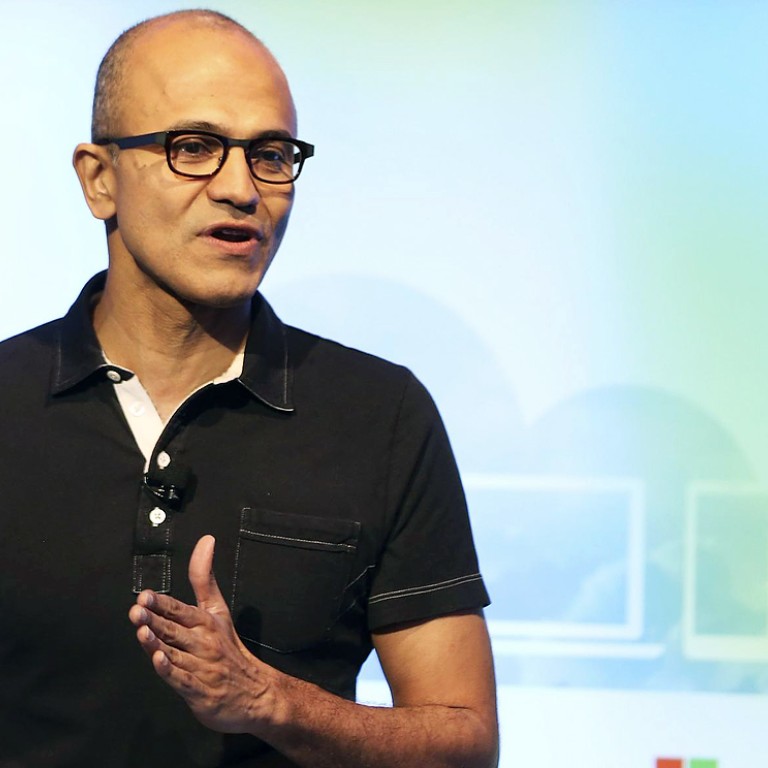
New Microsoft Satya Nadella CEO seeks to reinvigorate software giant
Satya Nadella wants his staff to step it up for a return to the innovative culture of the 1990s
The day Satya Nadella became Microsoft's chief executive, he invited several dozen vice-presidents to breakfast and had a simple, calm admonition for them: "Can you step it up?"
The engineer's tone was a departure from the yelling and wild gesticulations favoured by his salesman predecessor Steve Ballmer and the razor-sharp interrogations of co-founder Bill Gates. Nadella's approach underlines the low-key and analytical style he has brought to the chief executive's office since starting the job in February, as he seeks to revamp the world's largest software maker.
Nadella has unveiled plans to cut more than 18,000 jobs, killed off unpromising products and boosted sales of computing tools delivered via the internet, while seeking to reduce the company's reliance on software installed on personal computers.
He’s one of those people where you just hate to say no to the guy
"He's one of those people where you just hate to say no to the guy," Jeff Teper, Microsoft's head of corporate strategy, said in March. Teper hired Nadella into the company in 1992.
"Steve and Bill are a lot more confrontational - they challenge you to bring your A game," he said. "With him it's more like 'well I don't want to disappoint the guy, let me work a little bit harder here'. He's incredibly smart, he's gracious, but he's also super-demanding."
Nadella's lieutenants may need to work a lot harder to overcome the challenges facing Microsoft. The company's Surface tablet and Windows smartphones have failed to gain more than a few percentage points of market share, while the PC industry is on track to shrink for a third consecutive year.
The job reductions, mostly related to the integration of Nokia's handset unit, will result in US$1.1 billion to US$1.6 billion in charges over the next four quarters. Microsoft has not yet disclosed how much it expects to save from the firings. All the forecasts of analysts covering the company had gone "out the window", as they wait to hear what Nadella and chief financial officer Amy Hood have to say about the financial impact of the measures, said Mark Moerdler, an analyst at Sanford C. Bernstein.
"The elephant in the room was Nokia, and now the new elephant is that with the stock up so much year to date, will the fundamentals now deliver to back that up?" said Brent Thill, an analyst at UBS in San Francisco.
The employee lay-offs and streamlining of layers of management are not just about saving money, they are also about changing Microsoft's culture by speeding up decision-making and product development. A key focus for Nadella is getting workers to challenge entrenched practices that may be slowing the company down.
"I want us to be much more nimble and decisive," Nadella said this month. "So how do we empower the engineers and the salespeople in the field to be able to make decisions without having to go around in circles?"
The new chief executive sees Microsoft's main focus as "productivity and platforms", similar to the Microsoft of the 1990s when Nadella joined. At that point the company had two divisions - one focused on the Office family of e-mail, spreadsheet and document applications, and the other on Windows, the company's main PC software.
Nadella said his vision for those two categories was far more ambitious and focused on how to provide those kinds of products in a mobile-and-cloud world rather than one of PCs and servers.
To get there, Nadella wants his employees to build products from the point of view of a challenger, rather than the market leader which Microsoft has been for much of its 39-year history.
"We are going to innovate with a challenger mindset," Nadella told software developers who build applications for Windows at a conference in April.
As part of that, Nadella has the Office group focusing on applications that will be available on rival operating systems.
Apart from Office for Apple's iPads, Nadella has accelerated development of a version for Google's Android operating system, which is likely to come out later this year, according to a source.
